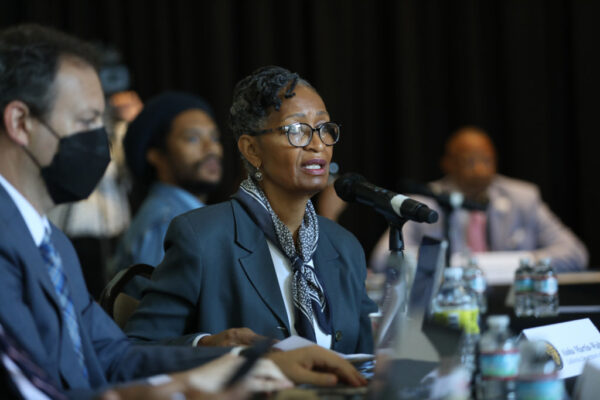The California Reparations Task Force voted to approve a plan to provide eligible Black residents with cash payments to atone for slavery and racism.
The reparations plan, which also includes an apology from the state, was approved during a vote by the nine-member committee on May 6.
According to The Associated Press, the plan was approved in Oakland over the weekend but will now be forwarded to the California Legislature. It will be up to the state’s lawmakers to determine if the reparations plan will be made into law.

The task force was convened by Democratic Gov. Gavin Newsom in 2020 to study how California historically harmed and discriminated against Black people and create a plan for atonement.
Following a two-year investigation, the committee’s 500-page draft included recommendations that the state apologizes for California’s racist behaviors and policies against Black residents dating back to 1850, the year the state was established.
The task force also recommended the state compensate residents with cash for offenses such as the over-policing of Black communities, unequal access to health care, housing discrimination and environmental pollution.
The cash payment estimates range from $2,300 per resident for every year they lived in California to compensate for the over-policing of Black communities to $77,000 per person to compensate for Black-owned business devaluations and losses due to racist policies.
The task force estimated that each Black person living in the state lost approximately $115,260, or $2,352 per year between 1971 and 2020 for mass incarceration due to the over-policing of Black communities.
Between 1933 and 1977, Black residents lost $3,366 per year or $148,099 per person due to the government’s racist redlining policy. The committee also estimated a loss of $13,619 per person per year or $966,921 for a 71-year-old resident — the current life expectancy of Black people in California — for health discrimination practices in the state.
The task force heard the testimony of at least 133 witnesses, including historic scholars and economists as well as families affected by racist policies stemming from slavery. The witnesses spoke on the state’s racist history, mass incarceration, housing discrimination and health disparities in Black communities. The witnesses also provided suggestions on how to compensate residents for racist policies.
“Reparations are not only morally justifiable, but they have the potential to address longstanding racial disparities and inequalities,” said U.S. Rep. Barbara Lee, D-Oakland.
Lee also called on the state as well as the federal government to pass legislation green-lighting reparations for Black Americans. The lawmaker is currently co-sponsoring a bill to study restitution proposals for Black Americans in Congress.
Chris Lodgson, an organizer for the reparations advocacy group Coalition for a Just and Equitable California, added that an apology isn’t enough.
“An apology and an admission of wrongdoing just by itself is not going to be satisfactory,” said Lodgson, adding that the state’s politicians also need to “include a censure of the gravest barbarities” and atrocities the state committed, including those by former Gov. Peter Hardeman Burnett.
Burnett was a white supremacist and owned enslaved Africans. He was also the state’s first elected governor and supported laws to create a whites-only California.
One law stated that whites could keep enslaved people for three years before they would be freed and forced to leave the state. If they did not, Black Americans would be whipped. The law was coined the Peter Hardeman Burnett’s Lash Law. Lodgson said state lawmakers needed to condemn the former governor as well.
Although California was a free state, it enforced the Fugitive Slave Act, which allowed enslaved people to be returned to slavery for more than a decade after slavery was abolished.
“By participating in these horrors, California further perpetuated the harms African Americans faced, imbuing racial prejudice throughout society through segregation, public and private discrimination, and unequal disbursal of state and federal funding,” the plan reads.
The task force says each person’s eligibility would be “determined by an individual being an African American descendant of a chattel enslaved person” or the “descendant of a free black person living in the United States prior to the end of the 19th century.”
How a resident would go about proving eligibility hasn’t been established, but the committee also recommended that state lawmakers establish a California American Freedman Affairs Agency to implement reparations if the plan becomes law. The agency would help people prove their eligibility and lineage through “genealogical research.”
The plan also recommended several policy changes not limited to but including free college tuition for all Californians eligible for reparations. It also proposed repealing the “three strikes” law, subsidizing down payments and mortgage payments for people residing in formerly redlined neighborhoods, universal health care and abolishing the death penalty.
The task force has until July 1 to submit the plan to the state legislature.


